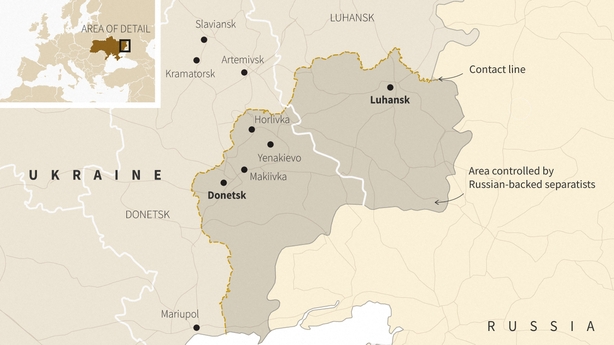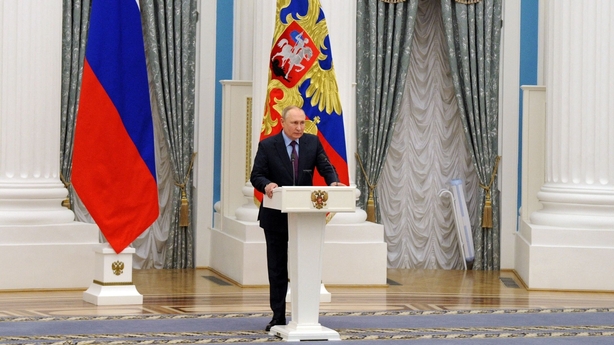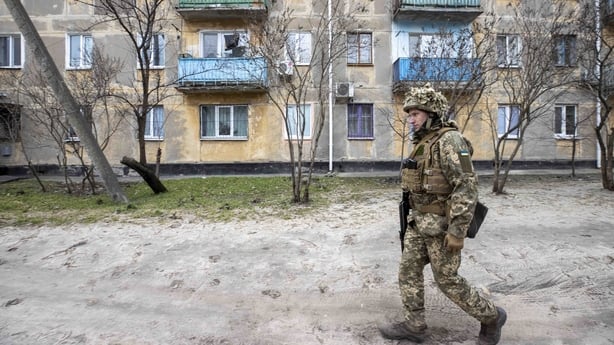NATO chief Jens Stoltenberg has said that Russian forces continue to prepare for a potential attack on Ukraine after Moscow recognised two separatist regions as independent.
He spoke as the West took more measures to try to discourage Russian from going on the offensive in Ukraine, with Germany putting the brakes on a new gas pipeline and Britain hitting Russian banks with sanctions.
"Every indication is that Russia continues to plan for a full-scale attack on Ukraine," Mr Stoltenberg said after an urgent meeting with Ukraine's envoy.
"We see that more and more of the forces are moving out of the camps and are in combat formations and ready to strike."
Mr Stoltenberg said "further Russian troops" had already moved across the Ukrainian border overnight into the Kremlin-backed territories.

Russia's parliament approved treaties with the two regions a day after Russian President Vladimir Putin said he was recognising the independence of the two enclaves in eastern Ukraine, which adjoin Russia and have been controlled by Russian-backed fighters since 2014.
Mr Putin said the territory covered the entire Donetsk and Luhansk regions of eastern Ukraine, not merely the parts currently controlled by separatists. The move appeared to increase the likelihood of conflict.
He also signed a decree on deploying Russian forces there, and today Russia's upper house of parliament formally granted his request to use troops abroad with immediate effect.
"What we see is further invasion of a country which was already invaded," Mr Stoltenberg said.
Moscow seized the Crimea peninsula from Ukraine in 2014 and has fuelled a separatist conflict in eastern areas for eight years that has killed over 14,000 people.
We need your consent to load this rte-player contentWe use rte-player to manage extra content that can set cookies on your device and collect data about your activity. Please review their details and accept them to load the content.Manage Preferences
NATO allies spearheaded by the US have already sent thousands of additional troops to bolster their eastern flank as tensions have soared with Moscow.
Mr Stoltenberg said NATO put its response force on higher readiness several weeks ago and has 100 jets on high alert and 120 ships at sea.

Meanwhile, Mr Putin said that the Minsk peace agreement on Ukraine no longer existed and that there was nothing left to fulfil, but he blamed Kyiv instead of Moscow for killing it off.
He made the comments at a news conference in Moscow today.
Ukraine's President Volodymyr Zelensky said he was calling up reservists for a special period but ruled out a general mobilisation.
Mr Zelensky said he was still pursuing diplomatic ways out of the crisis and welcomed Turkey's willingness to participate in multilateral talks, but said Ukraine would not cede any territory to Russia.
Addressing the nation after a cross-party meeting in parliament, Mr Zelensky announced a programme of "economic patriotism" that included incentivising local production and tax cuts on petrol.
Earlier today, he said Ukraine was considering breaking off diplomatic relations with Russia.
Mr Putin's announcement drew international condemnation and immediate US sanctions to halt US business activity in the breakaway regions and ban import of all goods from those areas.
Foreign ministers of EU countries unanimously agreed new sanctions against Russia over its recognition of breakaway regions in Ukraine's east and deployment of troops there, French Foreign Minister Jean-Yves Le Drian said this afternoon.
The EU nations "unanimously agreed on an initial sanctions package," Mr Le Drian told reporters after the Paris meeting of top diplomats, accusing Russia of "violating international law" and "breaching its commitments".
EU sanctions will also target Russian parliament members who backed recognising the breakaway regions as independent and will inflict severe damage on the country, the EU's foreign policy chief said.
"The sanctions will hurt Russia and will hurt a lot," Josep Borrell told reporters, adding that targets for asset freezes and visa bans included 351 members of the Russian Duma lower house who appealed to Mr Putin to recognise the two regions as independent.

Germany is Russia's biggest customer for natural gas, and the decision by Chancellor Olaf Scholz to freeze the Nord Stream 2 pipeline - built but awaiting approval - was widely seen as one of the strongest measures Europe could take.
In Donetsk, some residents celebrated, with cars flying Russian flags and sounding their horns. But several blasts were heard in the city today, and some people questioned whether Mr Putin's moves would bring peace.
Linda Thomas-Greenfield, US ambassador to the UN, told an emergency meeting of the Security Council that Moscow's recognition of the eastern regions was part of its attempt to create a pretext for a further invasion of Ukraine.
Russian UN ambassador Vassily Nebenzia warned Western powers to "think twice" and not worsen the situation.
China called for all parties to exercise restraint while Japan said it was ready to join international sanctions on Moscow in the event of a full-scale invasion.
US diplomatic staff, who had been moved from Kyiv to the western city of Lviv, were ordered to spend the night in Poland as the crisis deepened.
The United Nations said it was relocating some of its non-essential staff and their family members in Ukraine.
"We are committed to stay and to continue delivering in Ukraine, especially in eastern Ukraine," UN spokeswoman Alessandra Vellucci told reporters in Geneva.
"We continue to be fully operational."
Ukraine is ancient Russian land, said Putin
In a lengthy televised address last night packed with grievances against the West, a visibly angry Mr Putin said eastern Ukraine was ancient Russian land.
Russian state television showed Mr Putin, joined by Russia-backed separatist leaders, signing a decree recognising the independence of the two Ukrainian breakaway regions - the self-proclaimed Donetsk People's Republic and the Luhansk People's Republic.
In his address, Mr Putin delved into history as far back as the Ottoman empire and as recent as the tension over NATO's eastward expansion.
His demands that Ukraine drop its long-term goal of joining the Atlantic military alliance have been repeatedly rebuffed by Kyiv and NATO states.
"I deem it necessary to make a decision that should have been made a long time ago - to immediately recognise the independence and sovereignty of the Donetsk People's Republic and the Luhansk People's Republic," Mr Putin said.
Irish citizens urged to leave Ukraine
The Minister for Foreign Affairs Simon Coveney said there are around 64 Irish citizens currently in Ukraine, but this number may have decreased, as many people have responded to the requests to leave.
Mr Coveney said Ukraine is home for many of these people and they may choose to stay. He said the Government advice is not to travel to Ukraine and to leave the country.
He urged those who are considering leaving to do so quickly as "it is going to get increasingly difficult to get out because airlines are making decisions not to fly."
Speaking on RTÉ's Morning Ireland, he said Ukraine is country whose sovereignty Ireland has a responsibility to protect.
Simon Coveney has said that there are around 70 Irish citizens in Ukraine. He said that Ukraine is home for some of these people and they may choose to stay. The Minister added that the Govt advice is not to travel to Ukraine and to leave the country | https://t.co/sMUMiKseWk pic.twitter.com/0yHtvD5kdk
— RTÉ News (@rtenews) February 22, 2022
The minister also said that his department is working individually with families who are awaiting the births of their babies via surrogacy in Ukraine.
He said this situation is hugely traumatic for the parents and families involved, but that work would continue with families and agencies to ensure that people are reunited with their children as soon as possible.
Elsewhere, Russian Ambassador to Ireland Yuri Filatov said the decision to recognise the republics "was not spontaneous".
Speaking on RTÉ Today with Claire Byrne, he said: "It was long overdue. The aim is to protect the people of Donbass from the Ukrainian military.
"It has come to the point, either we protect people, either we ensure peace or there will be continuous suffering for all these people."

